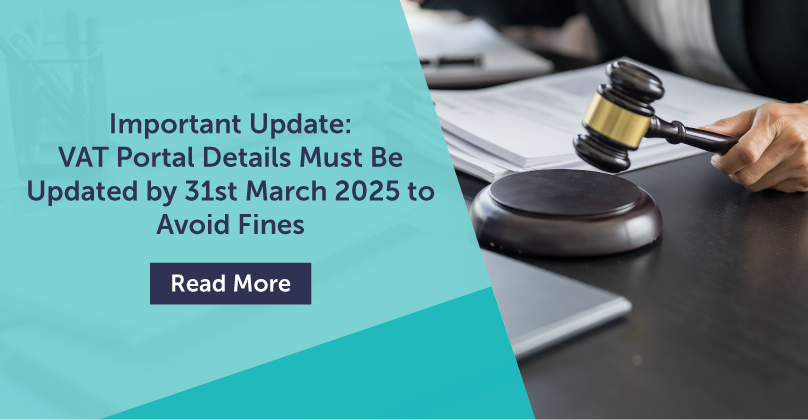
VAT Portal Details Must Be Updated by 31st March 2025 to Avoid Fines
As the regulatory landscape evolves, businesses must ensure that their tax-related details are kept up to date. One of the key updates for businesses registered under the VAT (Value Added Tax) system in the UAE is the mandatory update of VAT portal details by 31st March 2025. Failure to update your details by this deadline could lead to significant fines, penalties, and operational disruptions.
In this blog, we’ll explain why updating your VAT portal details is essential, what types of records need to be updated, the penalties for non-compliance, and how to stay on top of these updates to avoid costly mistakes.
Why You Must Update Your VAT Portal Details
The VAT portal serves as the central hub for businesses to manage VAT-related activities, including tax filings, payments, and other regulatory functions. The Federal Tax Authority (FTA) mandates that businesses keep their portal details accurate and up-to-date to ensure smooth tax processing.
Some of the critical updates that businesses need to make on the VAT portal include:
Changes in the Name of Managers/Partners: If there have been any changes in the individuals serving as the managers or partners of the business, these details must be updated on the portal.
Change in Business Name or Address: If your company has undergone a rebranding or moved to a new location, it’s essential to update these details to avoid any discrepancies in communication or legal documentation.
Addition of Branches: If your business has expanded to include new branches, these must be reflected on the portal for accurate reporting and compliance.
Update in the Memorandum of Association (MOA): Any updates or amendments made to the MOA of the company, which could affect the company's structure or operations, need to be updated in the portal.
Expired Information: Outdated documents such as expired trade licenses, Emirates ID, and passports of the owners/managers must be renewed and updated in the portal. Failure to do so could lead to discrepancies in your records and potential fines.
By keeping your records current, you can avoid unnecessary delays in VAT processing, ensure that refunds are processed without issue, and prevent penalties for non-compliance.
Penalties for Non-Compliance
The FTA is strict about maintaining accurate records in the VAT portal. If your business fails to update the required details by 31st March 2025, you could face significant financial penalties. The FTA guidelines specify the following penalties for defaulters:
AED 5,000 Penalty for First-Time Offenses: If you fail to update critical details such as business name, address, or manager information, the FTA will impose a penalty of AED 5,000 for the first violation.
AED 10,000 Penalty for Repeated Offenses: If your business continues to make the same mistakes or fails to update the necessary information after the first penalty, a higher fine of AED 10,000 will be imposed. This penalty reflects the FTA’s policy of taking a stricter stance against ongoing non-compliance.
These penalties can quickly add up and negatively impact your business's financial health, so it's crucial to make the necessary updates well before the deadline.
What the FTA Says: Guidance on VAT Portal Updates
The Federal Tax Authority (FTA) has provided clear instructions on what businesses need to update on the VAT portal. According to the official FTA guide, businesses must:
Review Business Information Regularly: Ensure that details such as the business name, address, contact information, and bank account details are accurate and up-to-date.
Report Changes Promptly: Notify the FTA immediately if there are any changes in the structure or ownership of the business, such as a change in partners, managers, or any amendments to the Memorandum of Association (MOA).
Renew Expired Documents: Ensure that documents like trade licenses, Emirates IDs, and passports are valid and up-to-date. Expired documentation can cause delays in VAT processing and may result in penalties.
Monitor Notifications from the FTA: The FTA may send out reminders or notifications if your business is required to make updates. Keep an eye on these communications to stay informed of any necessary changes.
Steps to Update Your VAT Portal Details
To avoid fines and ensure compliance, follow these steps to update your VAT portal details:
Log Into the VAT Portal: Visit the official VAT portal and log in using your credentials. If you have forgotten your login details, use the "Forgot Password" option to recover your account.
Review and Update Business Information: Double-check that all your business details are correct, including your business name, address, and contact information.
Update Manager/Partner Details: If there have been any changes in the managers or partners of the business, update these details. Ensure the names,
Emirates ID, and passport information of key personnel are accurate and current.
Add Branches: If your business has opened new branches, ensure that the new locations are added to the portal for accurate tax reporting.
Review the MOA: If your Memorandum of Association has undergone any amendments, make sure these changes are updated in the portal.
Renew Expired Documents: Ensure that expired documents such as trade licenses, Emirates IDs, and passports are renewed and updated in the VAT portal.
Submit Updates: After making the necessary updates, submit them through the portal. You should receive a confirmation that the changes were successfully processed.
Monitor for Confirmation: Keep an eye on the VAT portal for confirmation that the updates have been completed and approved. Retain records of all updates for future reference.
For any support, you can contact CLA Emirates, previously known as Emirates Chartered Accountants Group (ECAG). Our team of experts can guide you through the VAT portal update process and ensure your business remains fully compliant with FTA regulations.
Call for Consultation CLA Emirates, previously known as Emirates Chartered Accountants Group (ECAG)
Pradeep Sai | Partner
Mob: +971 556530001
Email: Pradeep.Sai@claemirates.com



